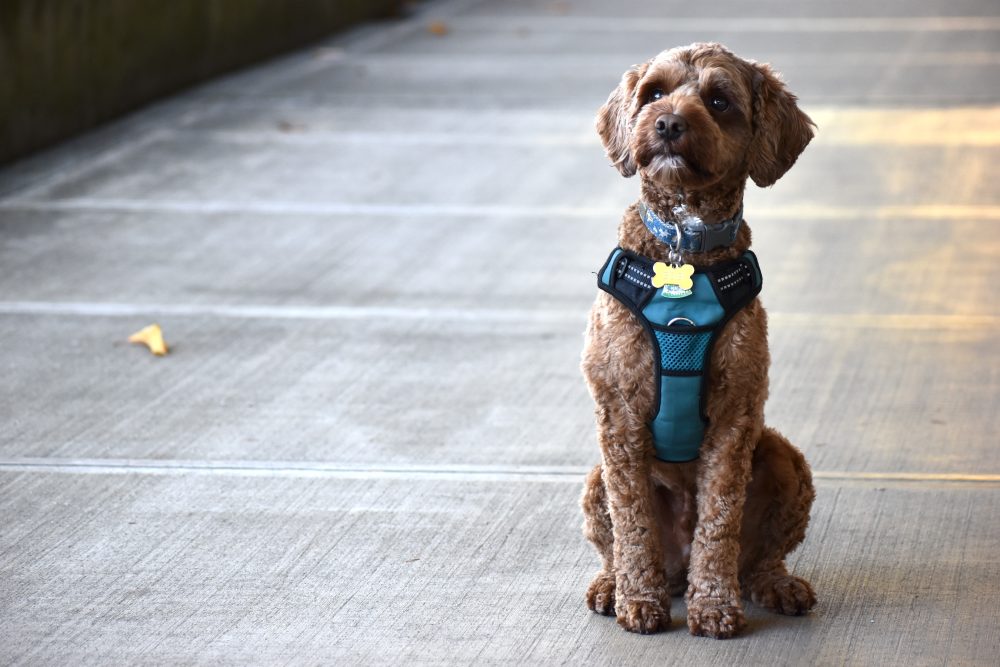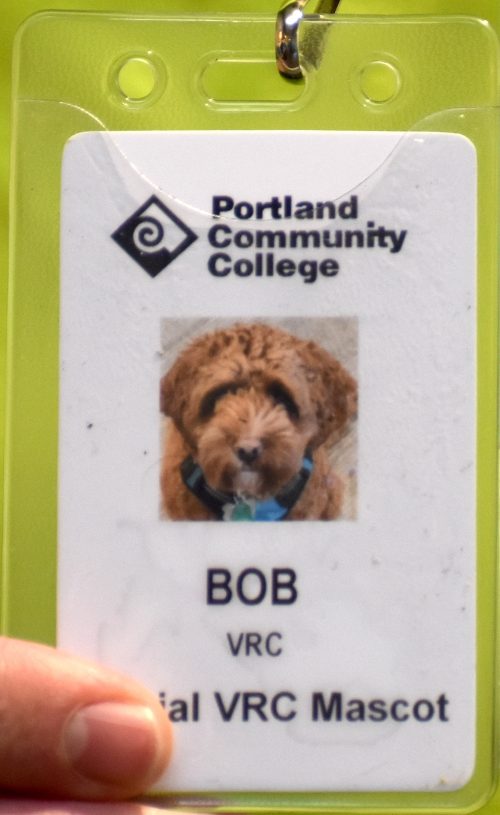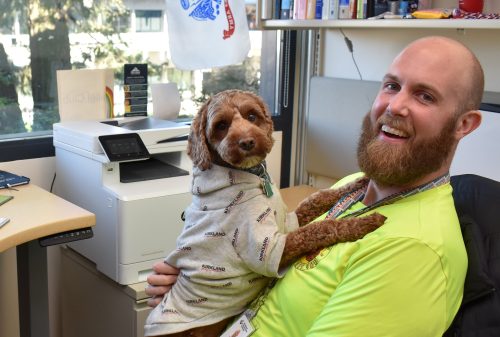This content was published: November 14, 2024. Phone numbers, email addresses, and other information may have changed.
Reporting for Duty: Local labradoodle becomes center of PCC’s veterans support
Story by Misty Bouse. Photos by James Hill.
No matter the season, it’s always the “dog days” at Portland Community College’s Sylvania Campus Veterans Resource Center (VRC).
Therapy dogs bring big benefits to mental health, and the Sylvania VRC is experiencing this firsthand. Matt Blankenship has served as the Sylvania VRC coordinator since 2019, and his fluffy partner named Bob—a 20-pound miniature Australian Labradoodle—has been a beloved presence on campus for nearly two years.
Bob is Blankenship’s emotional support animal that has been specifically trained to be a therapy dog. More than 20 years ago, Blankenship enlisted in the U.S. Army at a young age but his military career ended abruptly when he was injured and the Army ultimately medically separated him.
“My service experience was a bit non-traditional,” said Blankenship, who also opened the college’s first VRC at the Cascade Campus from 2011 to 2014. “Ever since I was a kid, I wanted to join the military, so I enlisted in the Army just before 9/11, at 17, and shipped-off right after graduation. I’ve always wanted to serve a purpose greater than myself and to be part of a team–and was certain I’d serve for 20 years.
“That process (the medical separation) was really difficult, but it inspired me to do the work I do now at PCC, helping veterans transition from the military to civilian life and support them through their journey,” he added.
Every Wednesday and Thursday, Bob accompanies Blankenship to the VRC, where his role is to interact with students to provide them with comfort, joy and stress relief. Unlike service dogs, who focus solely on their handler, therapy dogs like Bob engage openly with others, offering snuggles and emotional support. Currently, he is only available at the Sylvania Campus VRC.
For veterans like Blankenship or anyone needing comfort, the VRC provides an open, inclusive space, welcoming all students to stop by, enjoy the “Best free coffee on campus,” and connect. Also, from noon to 2 p.m., Tuesday, Nov. 12, the VRC will host light refreshments and a “Staff Wall of Honor” in the CC Building’s Upper Mall to celebrate Veterans Day.
The Veterans Resource Centers (VRCs) focus on providing veteran and military-affiliated students, their families, and the surrounding veteran community with advocacy, resources, programming and cultural engagement. The college has centers located on Cascade, Rock Creek, Southeast, and Sylvania campuses. Last year, PCC was named a Military Friendly School, a designation recognizing schools that invest in programs to recruit, retain and advance veterans as employees, entrepreneurs and students.
Blankenship and Bob share a special bond as do the students who utilize PCC’s veteran resources.
“He’s the youngest of three I have from the same line of dogs,” said Blankenship. “Bob’s temperament has always been ideal for this role—he’s not vocal or aggressive and is incredibly gentle with everyone, including children and people with disabilities. I noticed around six months old that Bob had the perfect temperament for this work, so I started training him for the therapy role at the VRC.”
He said Bob intuitively senses when someone needs extra attention, sitting close or curling up beside them. Many students now visit the VRC just to see Bob, who creates a welcoming environment for most. Blankenship shared a recent and moving experience involving a new student who was clearly distressed but not able to converse and near tears. After sitting with Bob for a while, her mood lifted, a testament to the dog’s comforting impact.
“Bob did what I couldn’t,” said Blankenship.
Even though Bob would not provide a comment for this story, he instead remained mission-focused. He dutifully toured the Sylvania VRC, saying “hello” to the gathered students and eliciting smiles and plenty of fun distraction.
Veterans who are seeking dedicated canine support can contact Paws Assisting Veterans (PAVE), which provides trained service dogs at no cost.



